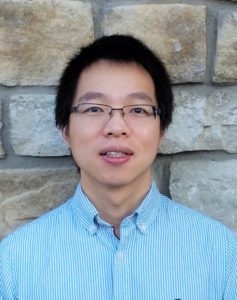
Less than two years into his career as an assistant professor of Electrical and Computer Engineering at Colorado State University, Haonan Chen has received the Ralph E. Powe Junior Faculty Enhancement Award.
The competitive award is sponsored by Oak Ridge Associated Universities and provides seed money for junior faculty members to investigate novel ideas, while enriching their research skills and professional growth.
Chen’s recognition marks a five-year winning streak of Powe award recipients from CSU. “I’m excited to receive this award and maintain CSU’s record of success,” said Chen.
Using artificial intelligence to predict severe weather events

Chen will use the award to improve storm prediction by advancing a method known as nowcasting – weather forecasting on a very short time scale.
From flash floods to landslides, extreme weather events are becoming more frequent and intense because of climate change. Chen is developing an artificial intelligence (AI) framework that draws on historical data collected by radars and satellites to predict the initiation of fast-evolving, severe storms.
“It is challenging to predict exactly when severe storms will start, and how long they will last,” said Chen. “Unlike traditional methods that rely on numerical weather prediction models or the current state of severe weather events, we are using AI to predict something we cannot see – storms that aren’t there yet,” said Chen.
His idea applies deep learning techniques – algorithms designed to function like the human brain – to gain actionable insights from cloud and environmental data, such as wind, temperature and humidity. The proposed methodology could predict whether a heavy rainfall event will occur in the next two hours, for example.
Chen – a two-time electrical engineering alumnus of CSU (M.S. ’13, Ph.D. 17’) – is collaborating with experts in cloud processes at Pacific Northwest National Laboratory and Brookhaven National Laboratory. He is building on a decade of research experience in atmospheric remote sensing and multidisciplinary data science, including radar and satellite meteorology, cloud and precipitation observations and processes, big data analytics and deep learning.
In addition to more accurate nowcasting of severe storms, Chen’s work could pave the way to improved weather warnings, leaving sufficient time for the public to assess and respond to risks.
“If we can improve the accuracy of short-term extreme weather predictions, we can help save lives,” said Chen.